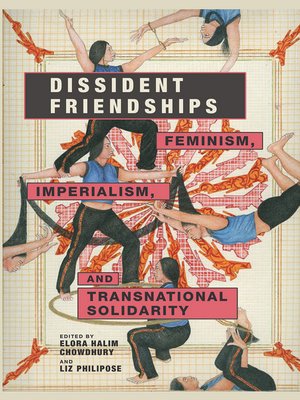Dissident Friendships
ebook ∣ Feminism, Imperialism, and Transnational Solidarity · Dissident Feminisms
By Elora Chowdhury

Sign up to save your library
With an OverDrive account, you can save your favorite libraries for at-a-glance information about availability. Find out more about OverDrive accounts.
Find this title in Libby, the library reading app by OverDrive.



Search for a digital library with this title
Title found at these libraries:
| Library Name | Distance |
|---|---|
| Loading... |
Often perceived as unbridgeable, the boundaries that divide humanity from itself—whether national, gender, racial, political, or imperial—are rearticulated through friendship. Elora Halim Chowdhury and Liz Philipose edit a collection of essays that express the different ways women forge hospitality in deference to or defiance of the structures meant to keep them apart. Emerging out of postcolonial theory, the works discuss instances when the authors have negotiated friendship's complicated, conflicted, and contradictory terrain; offer fresh perspectives on feminists' invested, reluctant, and selective uses of the nation; reflect on how the arts contribute to conversations about feminism, dissent, resistance, and solidarity; and unpack the details of transnational dissident friendships. Contributors: Lori E. Amy, Azza Basarudin, Himika Bhattacharya, Kabita Chakma, Elora Halim Chowdhury, Laurie R. Cohen, Esha Niyogi De, Eglantina Gjermeni, Glen Hill, Alka Kurian, Meredith Madden, Angie Mejia, Chandra T. Mohanty, A. Wendy Nastasi, Nicole Nguyen, Liz Philipose, Anya Stanger, Shreerekha Subramanian, and Yuanfang Dai.|
Cover
Title
Copyright
Contents
Acknowledgments
Introduction
PART ONE: PRAXIS OF FRIENDSHIP
1. Epistemic Friendships: Collective Knowledge-Making through Transnational Feminist Praxis
2. Meditations on Friendship: Politics of Feminist Solidarity in Ethnography
PART TWO: GENDER, NATION, SOLIDARITY
3. Bridging the Divide in Feminism with Transcultural Feminist Solidarity: Using the Example of Forging Friendship and Solidarity between Chinese and U. S. Women
4. For Sister or State? Nationalism and the Indigenous and Bengali Women's Movements in Bangladesh
5. Solidarity through Dissidence: Violence and Community in Indian Cinema
PART THREE: NEOLIBERALISM, AGENCY, FRIENDSHIP
6. Kinship Drives, Friendly Affect: Difference and Dissidence in the New Indian Border Cinema
7. The Space Between Us: Reading Umrigar and Sangari in the Quest for Female Friendship
8. Who Are "We" in the Novel?
PART FOUR: FRIENDSHIP ACROSS BORDERS
9. A Spirit of Solidarity: Transatlantic Friendships among Early Twentieth-century Female Peace Activists (Wilpfers)
10. The Dissidence of Daily Life: Feminist Friendships and the Social Fabric of Democracy
Contributors
Index
|
"Elora Halim Chowdhury and Liz Philipose's dazzling collection invites readers to consider the politics of feminist friendships, alliances, and collaborations. The volume explores the powerful ways that we can be transformed by our connections with others, and urges a new attention to feminist friendships as sites of generosity and empathy, alliance and resistance. Chowdhury and Philiopose's volume reminds us that friendship is fraught terrain, that we encounter each other across borders and boundaries of multiple kinds, and that the language of friendship can be co-opted by discourses of neoliberalism and imperialism. Yet their contributors urge us to continue to dream of the promise of connection, consciousness, and transformation that dissident friendships make possible."—Jennifer Nash, author of The Black Body in Ecstasy: Reading Race, Reading Pornography
"Rejuvenating our expectations of the most commonplace of human relations, Dissident Friendships challenges us to politicize that which is either overlooked or dismissed by more mainstream academic investigations. The intricate, and compassionate, analyses of friendship presented in these pages leave us renewed and provide an energizing vision for Gender Studies scholarship, social transformation and productive solidarities."—Shefali Chandra, author of The Sexual Life of English: Languages of Caste and Desire in Colonial India
...
"Rejuvenating our expectations of the most commonplace of human relations, Dissident Friendships challenges us to politicize that which is either overlooked or dismissed by more mainstream academic investigations. The intricate, and compassionate, analyses of friendship presented in these pages leave us renewed and provide an energizing vision for Gender Studies scholarship, social transformation and productive solidarities."—Shefali Chandra, author of The Sexual Life of English: Languages of Caste and Desire in Colonial India
...







